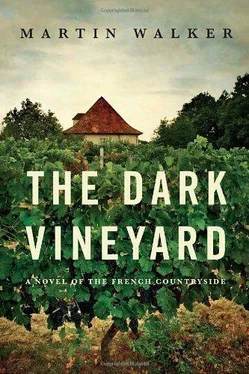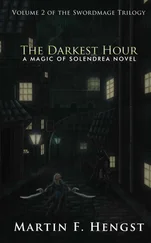Martin Walker - The dark vineyard
Здесь есть возможность читать онлайн «Martin Walker - The dark vineyard» весь текст электронной книги совершенно бесплатно (целиком полную версию без сокращений). В некоторых случаях можно слушать аудио, скачать через торрент в формате fb2 и присутствует краткое содержание. Жанр: Полицейский детектив, на английском языке. Описание произведения, (предисловие) а так же отзывы посетителей доступны на портале библиотеки ЛибКат.
- Название:The dark vineyard
- Автор:
- Жанр:
- Год:неизвестен
- ISBN:нет данных
- Рейтинг книги:5 / 5. Голосов: 1
-
Избранное:Добавить в избранное
- Отзывы:
-
Ваша оценка:
- 100
- 1
- 2
- 3
- 4
- 5
The dark vineyard: краткое содержание, описание и аннотация
Предлагаем к чтению аннотацию, описание, краткое содержание или предисловие (зависит от того, что написал сам автор книги «The dark vineyard»). Если вы не нашли необходимую информацию о книге — напишите в комментариях, мы постараемся отыскать её.
The dark vineyard — читать онлайн бесплатно полную книгу (весь текст) целиком
Ниже представлен текст книги, разбитый по страницам. Система сохранения места последней прочитанной страницы, позволяет с удобством читать онлайн бесплатно книгу «The dark vineyard», без необходимости каждый раз заново искать на чём Вы остановились. Поставьте закладку, и сможете в любой момент перейти на страницу, на которой закончили чтение.
Интервал:
Закладка:
7
Coux was a quiet place with a bakery, a tabac, a cafe and a small hotel where Bruno would occasionally join friends for Sunday lunch. It lay outside the commune of Saint-Denis, so he did not know it well. Thinking his jurisdiction was therefore somewhat limited, he left his cap in the van.
The phone booth stood in front of the tiny mairie, a scrap of yellow police tape still fluttering from the handle where it had been sealed. Bruno peered in, took note of the number and saw that the phone was one of the modernized ones that took no coins, only phone cards. France Telecom might have a record of the card used, but J-J’s team doubtless would have checked that. Behind the phone booth there was a bicycle stand and a small parking area, large enough for perhaps two cars and a motorcycle. Bruno scanned the ground. There was a patch of oil that looked fresh. He took a tissue from the pack in his car and gently pressed a corner into the edge of the stain. The thin paper went translucent, so the oil was recent enough to be interesting. Bruno strolled down to the small hotel to take a coffee with Sylvestre, the owner, who was also the chef and bartender. He asked Sylvestre if he’d seen anything the night of the fire.
“At three in the morning? I was fast asleep,” said Sylvestre. Sylvestre’s wife, poring over the account books at the cash register, said she had heard nothing. “But you might try the baker,” she told Bruno. “He’s usually up at about four to start the oven.”
Bruno strolled across to the boulangerie. The baker said he slept deeply until the alarm woke him at four, but he suggested Bruno try his uncle, a retired postman, who always complained of waking early and seldom getting back to sleep. “You’ll probably find him in the cafe. His name’s Felix, Felix Jarreau.”
Every cafe in France seemed to have a group of old cronies playing cards around a small table at the back of the room, their glasses of petit blanc beside them and a TV blaring away ignored above their heads. Bruno recognized Felix from his postman days, and like most people in the valley, Felix knew Bruno by sight. Bruno was introduced and shook hands all around, waited until he was invited to sit, declined the offer of a drink and explained his task. The bartender’s inevitable curiosity brought him across to their table with a bottle to refill the glasses. He hovered there as Felix said he had indeed heard something.
“Just after three-thirty-and I know because I looked at the clock when I woke up-I heard a motorcycle coming down the street and then stopping by the mairie. I looked out and the bike was parked and someone was going into the phone booth. But he wore a helmet, one of those big ones with a chin piece. He came out and went off down the hill.”
“Did you see his face? Would you know him again?” Bruno asked. Felix shook his head. “Not in that helmet.”
“Didn’t he take it off to make the call?”
Felix shrugged. “I didn’t look out for long, just went back to the kitchen to make some coffee.”
“What about the bike? Anything about it you remember?”
“It was a modern one, the kind they use for motocross, tiny mudguards, fast-revving engine, noisy. All the youngsters drive them these days.”
“Did you see him drive off?”
“No; didn’t hear him either. He could have freewheeled down the hill.”
Bruno climbed into the furnace of his van as the heat finally began to fade from the late-summer day. He opened all the windows and pondered the delicate tasks ahead. First he would have to interrogate Stephane, and then he would have to stop at Alphonse’s commune to deliver the death notice he had received in the office. Sighing, he set out on the same winding road up the hill that he had taken on the morning of the fire. He turned off over a small bridge by a wayside shrine that commemorated two young Resistance boys “fusilles par les allemands,” one of them Stephane’s uncle. This road led past a steep and muddy hollow that seldom saw the sun; Stephane rented it out to the local motocross club for their trail bikes. Beyond the hollow, with its constant buzzing whine of straining engines, Bruno came to Stephane’s pastures and the old farm, now almost overwhelmed by the new dairy and cow sheds and cheese barn.
He had spent many a happy evening here, enjoyed long Sunday lunches, brought back game from his hunting forays with Stephane and every February had helped the family kill and clean a pig in the annual ritual. He had taught Dominique how to rinse out the intestines in the swift brook of running water that led down to the shrine. Stephane’s friendship would be a central part of Bruno’s life long after the ministers of the interior and agriculture had been voted out of office. He would handle this meeting with great care.
“Salut, Bruno,” said the big farmer, greeting him at the entrance to the milking shed, a broom in his hand. Dominique was playing a running hose over the floor. She turned it off and clomped across in her big rubber boots to hug Bruno.
“We’re just finishing,” said Stephane. “Care for a little apero? I always reckon I deserve a Ricard after this job.”
“Not this time, thanks. I’m on business, looking into that fire. It looks as though it was started deliberately, so I’m checking with everybody nearby to see if they heard or saw anything at about three that morning.”
“That’s a bit early, even for me,” said Stephane. “I was up at about four-thirty, as usual, and then I got the phone call from the mairie. I looked out and saw the glow. I woke Dominique and we left the cows in the barn and took the truck up to the fire. That’s where we saw you. I didn’t hear anything. What about you, Dominique? You were fast asleep when I came to your room.”
She shook her pretty head, her cool gray eyes and clear complexion the very image of youthful innocence. “I didn’t hear anything, not even the phone.”
“Did you know the place at all, from when you were working at the research station?”
“Sure; I was up there once or twice a week to bring back samples and take up testing equipment. We never left expensive stuff there overnight. And every time I was there, I had to fill in the log, but that must have been burned.”
“So you knew what they were growing up there.”
“You mean those GMO crops? They used to scare me stiff, but not now that I know more about it. The only thing that worries me now is contamination, seeds blowing over into our fields and getting into the crops and maybe into the milk. One of the projects I worked on was seeing whether we could test milk for GMO traces. I remember worrying what might happen to my dad if our customers thought they were getting these traces of Frankenstein foods in his milk and cheese.”
“I see what you mean,” said Bruno. “What did you do?”
“I asked the scientists at the station and did some research and found they weren’t growing that kind of crop.”
“We talked about it a lot,” Stephane added. “Dominique said not to worry.”
“Well, I’m no expert, but I can’t say I’m feeling very reassured,” said Bruno. “Still, it seems there wasn’t anything secret about what was being grown up there.”
“All of us who worked there knew, naturally,” said Dominique. “But like I said, it wasn’t in our interest to spread the word. And it’s not as though there were any farms up there with crops at risk; the land is too poor.”
“So you’re less worried about this GMO stuff now, is that right? I remember you used to be a real ecolo when you were at school, with you and Max winning that mock election.”
“I’m still a real ecolo,” she said, almost snapping. “And so’s Max. It’s just that there are bigger things to worry about-global warming, the ice caps, millions of refugees as the sea levels rise. That’s when we’ll need GMO crops to feed people. Did you know the Rice Research Institute in the Philippines has developed a gene that will let rice plants live for twelve days after being flooded with salt water? That could save millions of lives in Asia.” She turned to her father. “Remember how I used to be dead set against nuclear power? Well, these days I can’t wait for them to build more reactors because it’s better than carbon. The Green movement has grown up, Bruno. We had to.”
Читать дальшеИнтервал:
Закладка:
Похожие книги на «The dark vineyard»
Представляем Вашему вниманию похожие книги на «The dark vineyard» списком для выбора. Мы отобрали схожую по названию и смыслу литературу в надежде предоставить читателям больше вариантов отыскать новые, интересные, ещё непрочитанные произведения.
Обсуждение, отзывы о книге «The dark vineyard» и просто собственные мнения читателей. Оставьте ваши комментарии, напишите, что Вы думаете о произведении, его смысле или главных героях. Укажите что конкретно понравилось, а что нет, и почему Вы так считаете.












